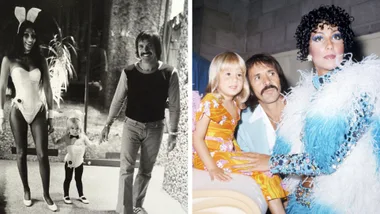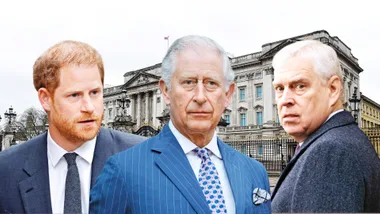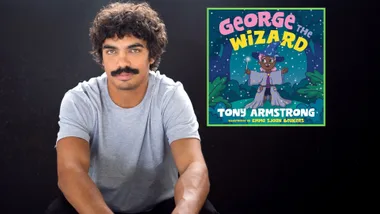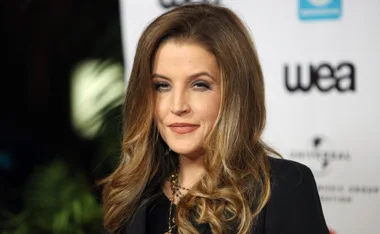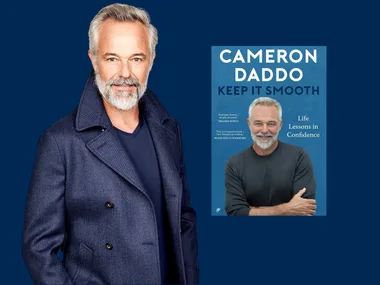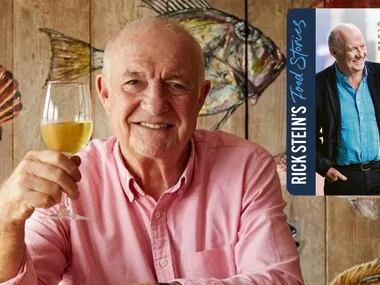Exclusive extract from The Hunter’s Wife by Katherine Scholes, the Great Read in the February issue of The Australian Women’s Weekly.
Mara peered intently ahead as she steered the Old Land Rover over the trackless terrain, avoiding the honey-badger holes and termite hills. The two Manyala Land Rovers had set off a little earlier and were now out of sight in the next valley; but there were small clues to the route they had taken: the occasional crushed brush or flattened pile of dung.
Her only passenger was Peter. He’d lingered by the lake taking photographs and, since the others were keen to get back and tackle the equipment maintenance and paperwork that followed each day’s shooting, she’d offered to wait for him. Now he was leaning out through the passenger-side window, assessing the way ahead, lifting one hand, at intervals, and simply saying, ‘This way,’ or ‘That way.’ He seemed to understand instinctively that driving cross-country like this was an activity that involved everyone on board. Mara guessed that if the conditions had been more demanding, he’d have been quite happy to sit on the spare tyre on the bonnet, or even stand on the front bumper bar to asses the ground ahead.
The late-afternoon light brewed strong colours in the land – he sky was purple, the earth a deep red, overlaid with a thin covering of spun gold grass. Trees and bushes were beginning to flatten into silhouettes. The birds resting in their branches were splashes of white that blazed as though lit from within. Mara glanced at Peter. She could see he was struck by the beauty of the landscape as well, and she felt a burst of pride as if she were somehow responsible for it all.
‘This reminds me of home,’ Peter commented. ‘Australia, I mean…’
Mara nodded, feeling a wave of longing at his words. The landscapes of Tanzania often evoked her memories of Tasmania – especially the area around Coal River. Even the names of the two were linked. Tanzania and Tasmania sounded so similar, many people in the world thought they were the same place. In her early days in Africa, Mara had savoured this connection; it had helped her feel a sense of belonging. But now she found it increasingly painful to think about her old home – how she’d left there with such high hopes for her future. Her letters to her mother were becoming shorter and less frequent. The truth about her life here was no longer something she wanted to share.
‘How long have you ever been here?’ Peter asked her.
‘A bit over three years now.’
‘Have you been back for a visit?’
Mara shook her head.
‘You must miss seeing your family. Do you have brother and sisters?’
‘Just brothers,’ Mara said. ‘But lots of them!’
She paused, an aching lump in her throat. She wanted to tell Peter that sometimes the way he did things – his little mannerisms – reminded her of them so keenly it took her breath away.
‘I was an only child,’ Peter said. That’s why I always wanted to have a big family of my own. But I had a happy childhood. We had a house right on the beach at Bondi. I lived in the surf – before school, after school, during school. That’s why I had become an actor. I couldn’t get a real job.’ He smiled, but then grew serious. ‘I’d love to move back to Australia, actually. I’d prefer to bring the kids up there. But Paula doesn’t want to leave America and I guess it’s more important for her to be where she wants to be. I’m away now and then, after all.’
Mara was unsure how to reply – the conversation seemed to have grown suddenly personal. Being alone together in the Land Rover, after the day’s filming, had made them seem like old friends. But they weren’t, Mara reminded herself. He was Peter Heath and she was jus the safari hostess, driving him home from location.
She slowed and swerved to avoid a dried-out riverbed. A narrow ribbon of dark earth was the only clue to its presence, but she knew that beneath the dry surface of the ground that bordered it, was a layer of deep wet mud. The Land Rover would break through the firm crust, and sink to its axles. She hauled at the steering wheel, aiming towards higher ground.
‘Wait! Stop!’ Peter called.
Responding to the urgency in his voice, Mara slammed on the brakes.
‘What’s that over there?’ Peter pointed along the riverbed to the place where it opened onto a wide pan of dark mud – all that remained of a rainy-season lake – and raised a pair of binoculars to his eyes. ‘It’s an animal – stuck in the mud. It looks like a young buffalo.’ There was a brief silence as Peter leaned further out of the window, still peering through the binoculars. ‘It moved its head!’ he called back into the cab. ‘It’s alive! We have to do something.’
He swung one arm in an arc. ‘If you drive round that way we can get right up to it, The ground looks fine.’ Mara kept the engine idling. She knew the rile: in a situation like this, a wild animal should be left to its own fate.
Peter lowered the glasses, turning to Mara. ‘There must be a way to get out of there.’
Mara’s hand hovered over the gear stick as she scanned the open grassland. The only animals in sight were a few Thomson’s gazelles, grazing in a relaxed manner, tails flicking constantly from side to side. There was no sign of buffalo. She felt a wave of relief. Buffalo were some of the most dangerous animals in the bush. A herd could materalise soundlessly, encircling a hunting party or group of sightseers. Usually they just stood in a menacing stillness, but if stirred to anger for some reason, they became murderous – and the hard shell of a Land Rover offered only temporary protection from their attack.
‘The herd has gone,’ Peter said, as if reading her thoughts.
‘They’ve left it behind,’ Mara nodded.
‘There wouldn’t have been much they could do by staying. They haven’t got trunks, like elephants, to try to pull it out.’
‘Come on, then,’ Peter said impatiently. ‘Let’s go.’
Mara looked away. Inside her head, she could hear John’s voice – calm and sure and reasonable. Leave it alone. The herd is gone. It’ll die anyway. Glancing sideways, she saw Peter guessing the meaning of her hesitation. Shock and outrage gathered in his eyes. Again, Mara knew exactly what John would have said. You have to be able to make the tough decisions. Africa is not for the faint-hearted.
Mara looked at Peter’s face. His eyes were screwed up at the corners like someone wincing in pain. She knew just how it felt, to look like that – the way each muscle tightened, pulling the skin into lines. It was so familiar to her that she might have been watching her own reflection.
Suddenly, she made her decision. Without saying anything, she reached down to select low ratio and then let out the clutch. The vehicle lurched off slowly in the direction of the dried-up lake.



